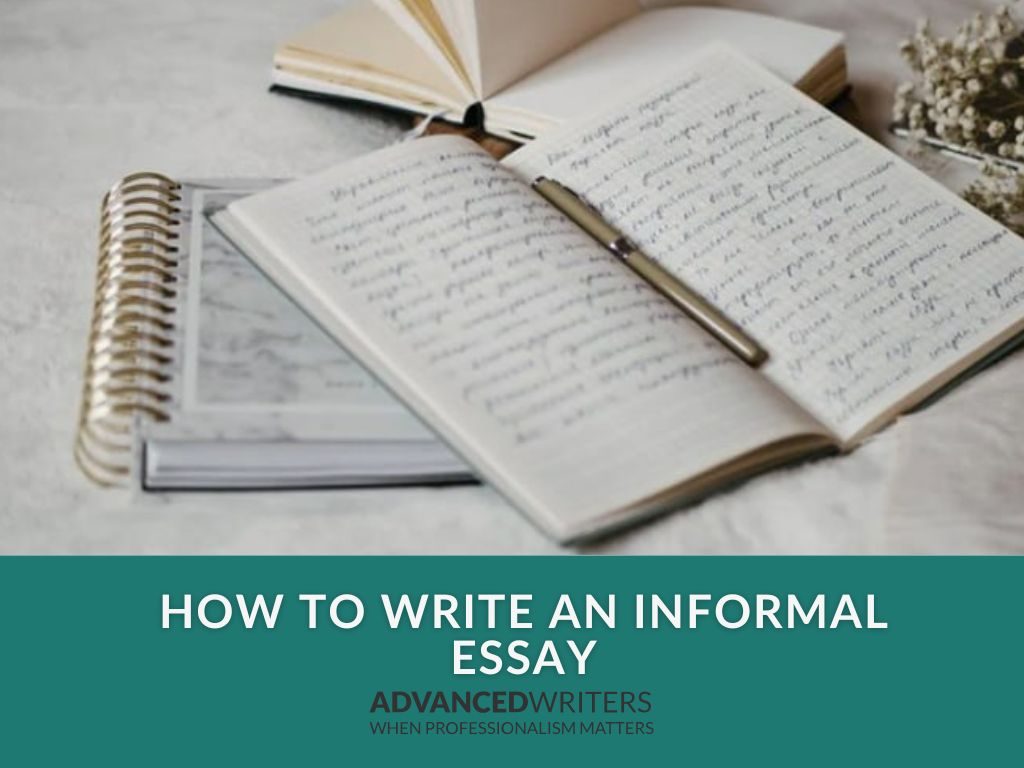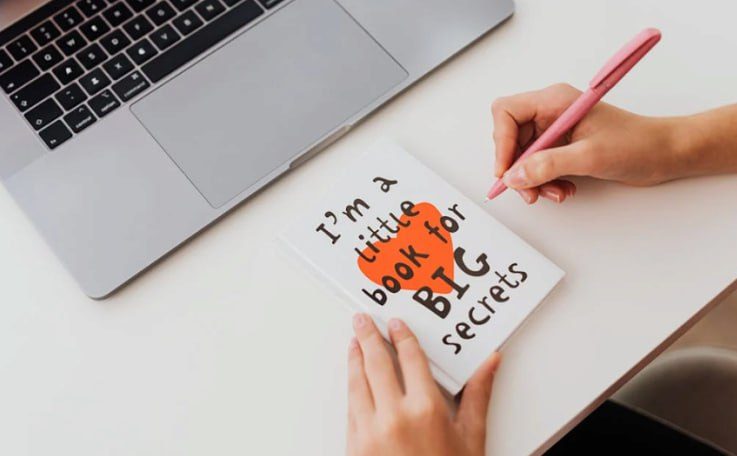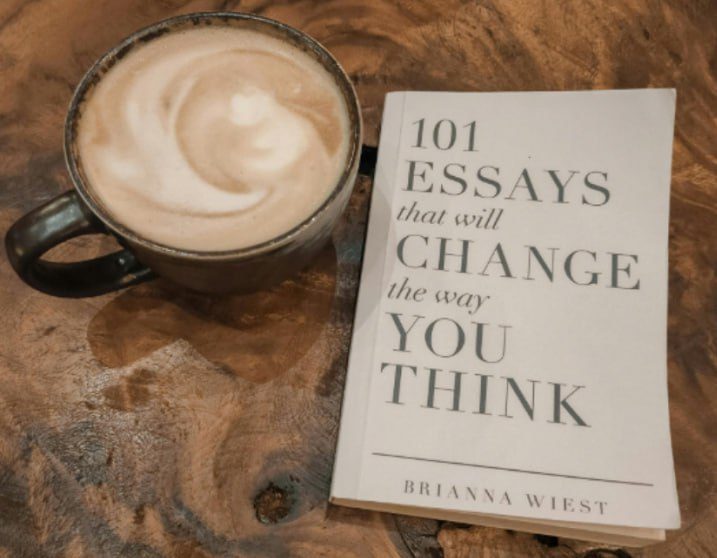How to Write an Informal Essay
In this guide, you’ll find actionable tips and practical advice on how to write an informal essay.

Look:
Students craft many writing assignments in college, and many are the types of essays they have to cover. Topic(s), purpose, format, structure, style — these details differ depending on the paper type assigned. As a writer, you should understand the peculiarities of different essays to craft your own like a pro.
Informal essays allow you to communicate thought-provoking statements on controversial topics. They are your opportunity to reflect on the covered theme and inform the reader of your ideas about it.
Ready to learn how to do that and make your informal writings stand out?
What Is an Informal Essay?
An informal essay is a type of writing that allows you to express your ideas, opinions, and reflections in a more casual and personal tone without the strict constraints of an academic format.
Mind the difference between informal and informative essays:
Informative essays educate readers, providing facts and research-based evidence on the topic. You don’t argue or try to persuade them but instead share data, describe, compare and contrast, explain how to do something, etc.
In turn, an informal paper involves more personalized and emotional writing. Here, you reflect on a topic, expressing your thoughts on it. It’s a creative paper that:
- Communicates strong emotions on the topic;
- Entertains readers while informing them about a particular problem that bothers you;
- Presents your ideas in a first-person language style and may persuade the audience to change their opinions on the discussed issue.
Our experts at AdvancedWriters assist students with both informal and informative essays, so feel free to ask your questions and address them for help.
Purpose
Informal writing is about expressing a personal experience. Here, you don’t have to follow strict formats and rules, which often hinder a writer’s expression of their sincere feelings and emotions on the topic.
As a rule, teachers assign informal essays to learn more about their mentees and their attitudes to a personality, a controversial issue, or an event.
Your purpose:
- Engage readers on a more personal level.
While formal essays and research papers adhere to strict guidelines and styles, persuading or informing through logical arguments and references, informal papers are more flexible: They reflect a writer’s own personality and communicate less a formal statement than a set of personal opinions and views.
- Explore the topic and comment on it more naturally (conversationally) and spontaneously rather than proving your points with dry language and facts.
Think of this essay as if it were a personal blog, opinion piece, or work of creative nonfiction. Share your knowledge and message and demonstrate a personal connection to the topic.
Criteria
Let’s move to the criteria you need to meet for your informal paper to appear compelling and A-worthy. There are four of them:
- Inform the audience.
- Reveal your creativity when presenting the subject.
- Rely on a clear structure to explain your thoughts and ideas.
- Include your personal connection to the topic.
So:
You need a thought-provoking topic for your paper. When writing informal essays, provide a clear thesis and include details to support your point of view. While you are sharing personal opinions, you should still demonstrate your understanding of the topic and present reasons for supporting your concepts.
Think of a creative way to talk about the topic. Storytelling (narrative writing) with an informal writing tone is your core instrument for communicating the message:
Develop clear statements, but use imagery and reflections so readers can relate to your story and see your connection to the topic.
Formal vs. Informal Writing Process
To make a long story short and all things clear, we’ve gathered the significant differences between a formal and informal essay in the table below. Check and remember them before you start writing your next paper.
| Formal essay | Informal essay | |
| Topic | Disciplinary topics (History, Science, Literature, etc.) | Life experiences or opinions related to a particular topic or issue |
| Purpose | Present and discuss facts, analyze the subject through arguments and reliable evidence (Like in an argumentative essay, a persuasive essay, a critical essay, etc.) | Show your personality, reflect on the subject, entertain the reader, show your opinion or emotions |
| Viewpoint | Third-person (it, he, she, they) | First-person (I, we), sometimes second (you) |
| Tone | Objective and professional (no emotional input); strong arguments and unbiased facts | Subjective and personal; may be expressive, ironic, controversial, and casual |
| Structure | A standard essay (introduction, body, conclusion) | A traditional (standard) outline but with the freedom to change it by case |
| Language (vocabulary) | Formal, with no jargon or collocations | An informal writing style: abbreviations, colloquialisms, a conversational tone |
Before Writing Informal Essays
Before we dive into particular steps, let’s mention a few essential pre-stages you should consider when you start writing:
Choose a worthy topic and keep the informal essay structure in mind.
Know the Format
Informal writing isn’t as strict as academic research papers, but it still has a form, a structure, and a writing style. Check your assignment carefully to ensure that you understand all the technical details: the word count, citation style (if any), topic (if one is given or if you can choose your own), and overall prompt.
| Essay level: | Length: | Words: |
| High School | 1-3 pages | 250-750 |
| College (Undergraduate) | 2-4 pages | 500-1,000 |
| University (Undergraduate) | 3-5 pages | 750-1,250 |
| Master’s | 4-6 pages | 1,000-1,500 |
| Ph.D. | 5-8 pages | 1,250-2,000 |
With this information in your pocket, you’ll know how to organize your essay for better engagement and flow.
| Essay section: | What to include: |
| Title | Make it catchy and descriptive; ensure that it reflects your essay topic and main idea. |
| Introduction |
|
| Body |
|
| Conclusion |
|
| References |
|
Brainstorm the Topic
Even if your teacher prescribes a topic for essay writing, it won’t be specific enough. For example, they may ask you to write about a person or event that influenced your decision to enter a particular university or move to another city. How do you understand what exactly to describe?
Whether you have a specific question in your prompt or can pick a topic yourself, the best way to know is to brainstorm writing ideas for your informal essay.
How?
Here are several brainstorming strategies to help you:
- Freewriting — List your ideas without stopping or editing for 10-15 minutes. Write everything that comes to your mind and choose a potential topic from those generated.
- Mind mapping — Write down a central theme and think of related ideas from the center. The connections between them may help you develop a new, original idea for your paper.
- Trend stealing — Read the news and find trending topics in your niche. List those that interest you and choose the one you like the most.
Research (If Necessary)
Informal essay writing is about having a conversation with the audience and sharing your reflections on a topic. You don’t need to research academic books, journals, or websites for arguments and evidence; you can tell a personal story and share your experiences.
However:
If you decide to share others’ opinions or take statements for your essay from third-party reliable sources, you need to mention it. List all the cited resources in your references section to avoid plagiarism and prevent copyright infringement.
Do you find it challenging to write an informal essay by referencing others? We’ll help you choose relevant and trustworthy sources for your academic papers and format them according to your required citation style. Just ask!
Write a Thesis Statement
Like any other academic paper, informal essays should have a thesis, aka the main idea you’ll communicate to the audience. Though less formal, it should still be clear and straightforward for readers to understand your position on the topic.
Craft a thesis statement before you move to write an essay outline and draft — and you’ll understand how to structure the paper and what claims to use for a more compelling composition.
Tips:
- Make a claim indicating your position on the topic in one sentence.
- Demonstrate your critical thinking and analytical skills.
- Add an arguable or thought-provoking element to engage readers.
Your thesis will appear as the closing sentence in your introduction.
How to Write an Informal Essay: 5 Steps
Now, it’s time to move to the writing process and structure your paper. Let’s check it step by step.
1 — Outline Your Essay
So, you have a topic. You’ve researched it and developed a thesis statement that communicates the main point of your future paper. Now, take all this information and write a plan:
Outline the key points you’ll cover in your essay.
An essay outline is a framework to help you organize the process of writing informal essays. It lists the main points you’ll write in the introduction, body paragraphs, and conclusion. Why outline your essays?
- To formulate the main ideas
- To create a central focus in your story
- To link ideas to a core thesis
- To maintain a logical flow in your paper while writing and not miss any essential details
2 — Write an Introduction
The opening paragraph of your informal essay should include these three components:
- Hook: Think of a catchy yet relevant opening sentence to engage the audience and motivate them to keep reading. Informal essays aren’t as strict in structure and tone as other academic papers, so your hook can be a joke, a personal anecdote, or a weird fact related to your topic.
- Background: Provide context for your story and mention why it’s essential.
- Thesis statement: Complete your introductory paragraph with a central claim you’ll communicate throughout your essay.
3 — Craft the Body Paragraphs
The body section of your paper contains arguments, reflections, and other details that support your narrative and help readers understand your statements and ideas. There are no strict rules for the number of body paragraphs in your essay: Craft as many as you need to communicate your story.
Start each paragraph with a topic sentence (an opening statement that guides readers on what information to expect), and remember to connect it to your central thesis.
- Use first-person, informal language. Remember to provide your opinions and reflections on the topic. Think of untrivial, attention-grabbing, or thought-provoking concepts to cover in your essay.
- Include transition words between sentences and paragraphs for a logical and smooth flow of your thoughts. They enhance readability and help you keep the audience glued to your text.
4 — Write a Conclusion
Once the other paragraphs are ready, write a conclusion for your informal paper. This final section closes your statements and reflections, leaving readers with insight or food for thought.
What to do in a concluding paragraph:
- Restate your thesis and repeat your narrative’s significance.
- Recap the key points you discussed in the body paragraphs.
- Summarize everything and end your essay on a positive note.
5 — Revise
Re-read the first draft of your paper and make the necessary changes for a better style or logical flow.
For example, you may want to revise some thoughts or reorganize paragraphs for your entire essay to meet required writing standards. Alternatively, you might see that your thesis needs more assertive statements or better clarity. Once that’s done, proofread your final draft to ensure that it’s free from typos, grammatical mistakes, and other syntactical errors.
If you want a professional editor to assist with revising and improving your drafts, you can hire an essay-writing expert here at AdvancedWriters. Share your final document, and let us help you polish your text.
Writing Tips for Making Your Essay More Engaging
For you to craft a good informal essay, consider these short yet actionable tips when writing:
- Use conversational language and “I” statements.
- Write short body paragraphs for better readability and engagement.
- Evoke readers’ emotions; for that, include personal stories, humor, reflections, descriptive insights, etc. (More on that below.)
- Choose simplicity over complexity.
- Use transition words between paragraphs for smoother flow.
- Feel free to use an alternative structure for your paper. When you craft an informal essay, you can break some of the rules of academic writing.
- Check several great examples of informal papers before writing yours. They can help unleash your creativity, peek at some concepts related to structuring your essay, and better understand what elements to include for better results.
| Element of informal writing to include in your text | Description |
| Opinions and beliefs | Express your views on a topic. |
| Personal stories | Add personal experiences to the main body of your paper to make it more engaging and relatable. |
| Humor and anecdotes | Incorporate jokes, amusing observations, or brief, illustrative stories to entertain readers. You can use a joke at the first stage: Open your essay with it to hook the audience. |
| Emotional insights | It’s not a formal paper, so mention your feelings or emotional responses to the topic. |
| Descriptive details | Add details (describe people, places, events) to create a clear picture for readers. |
| Observations | Include observations that tie into your essay’s theme. |
| Cultural references | Mention cultural events, books, movies, music, etc., related to your topic. It will add context and relevance to your paper. |
| Reflections | Reflect on your growth or lessons learned in relation to your discussed topic. |
Mistakes to Avoid in Informal Essays
While such essays are less about formal language and more about conversational writing style and reflections, that doesn’t mean you can stick to chaos during the writing process.
Below are the most common mistakes students make in informal papers. Please do your best to avoid them when crafting yours:
- No structure: Failing to organize your thoughts will result in a confusing essay composition.
- Overly casual language: True, it’s not a formal paper, but overplaying with casualness may distract or frustrate readers.
- Too much humor and personal anecdotes: This can undermine the depth of your discussed topic.
- An inconsistent tone: Switching between informal language and a formal tone makes your story vague.
- No transitions: This leads to abrupt jumps between your ideas and essay sections.
15 Informal Essay Topics for Your Inspiration
Wondering what to write about to create a worthy story and present your ideas to a broader audience? Below is a list of fresh ideas for your essay writing.
Check these topics and pick one as a basis for your next paper about life, interests, challenges, moral issues, cultural phenomena, etc.
- Why we should ban morning classes (A night owl speaking).
- The art of procrastination: My step-by-step guide.
- How to survive college on a ramen-only diet.
- Why my roommate deserves a reality show.
- The science of choosing the perfect Netflix show to watch instead of studying.
- Confessions of a serial overthinker.
- A love letter to my favorite coffee shop (and to the barista who knows my order by heart).
- Why is “just five more minutes” of sleep never just five minutes?
- The hidden benefits of talking to yourself.
- How to convince yourself that walking to class counts as exercise.
- The unspoken rules of dorm life (that no one warned me about).
- Why laundry day is a battle I always lose.
- The ultimate guide to avoiding eye contact in awkward situations
- The life and death of my New Year’s resolutions
- The emotional rollercoaster of checking your bank account balance.
Professional Help With Informal Essays
That’s all, folks! You have this detailed guide on how to write an informal essay in your pocket, and it can make your papers more comprehensive and engaging.
Any doubts or questions left?
The expert writers on this website help students with all types of academic papers on different topics and in various disciplines. Don’t hesitate to ask — place your order today.


